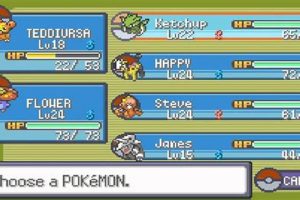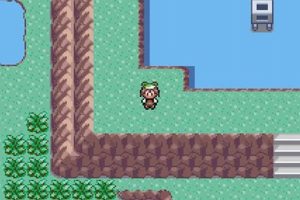The phenomenon being explored here refers to humorous or unexpected lines of dialogue and text that appear within a particular Game Boy Advance role-playing game. These occurrences can range from unintentional misspellings and grammatical errors to deliberate attempts at comedic relief within the game’s script. An example would be an unusual or nonsensical comment made by a non-player character (NPC) during a conversation, deviating from the expected serious tone of the game’s narrative.
The significance of these amusing textual elements lies in their ability to enhance the overall player experience. They inject levity into potentially repetitive gameplay, fostering a sense of discovery and amusement. Furthermore, they contribute to the game’s enduring legacy and popularity, often becoming shared memes and inside jokes within the gaming community. In some instances, these instances highlight localization challenges encountered during the game’s development, offering a glimpse into the process of translating and adapting content for different audiences.
The subsequent discussion will delve into specific examples of these noteworthy textual quirks, analyze their origins and impact, and examine their role in shaping the broader perception and enjoyment of the game in question. We will examine how these elements, whether intentional or accidental, have contributed to the title’s memorable status within the gaming landscape.
Strategies for Interpreting Humorous Textual Anomalies
The following recommendations offer a structured approach to understanding and appreciating the unusual textual elements found within the game.
Tip 1: Contextual Analysis: Examine the phrase within its immediate conversational context. Understanding the surrounding dialogue or situation can clarify the intended meaning, even if the wording is unconventional.
Tip 2: Linguistic Scrutiny: Analyze the specific grammatical errors or unusual word choices. Identifying deviations from standard language conventions provides insight into potential translation issues or deliberate comedic choices.
Tip 3: Character Motivation Assessment: Consider the speaker’s character traits and motivations. A seemingly nonsensical phrase might be consistent with a character known for their eccentric behavior or limited intelligence.
Tip 4: Community Engagement: Consult online forums, wikis, and community discussions. Shared interpretations and analyses from other players can provide valuable perspectives and uncover hidden meanings.
Tip 5: Comparative Script Analysis: If available, compare the English text with the original Japanese script (or other language versions). This comparison can reveal translation nuances and identify potential sources of humor or misunderstanding.
Tip 6: Intended Audience Consideration: Recognize the game’s target demographic. Humor is often subjective, and what may seem nonsensical to one individual might resonate with the intended audience’s sensibilities.
Tip 7: Retrospective Evaluation: Reflect on the phrase’s enduring popularity and cultural impact. Understanding why a particular phrase has become a meme or inside joke sheds light on its broader significance.
By employing these strategies, players can move beyond simply observing humorous textual occurrences and gain a deeper appreciation for their origins, intended effects, and contribution to the game’s overall appeal.
The following sections will explore specific examples and demonstrate the application of these interpretive strategies in detail.
1. Localization Quirks
Localization quirks represent a significant source of humor within the designated Pokmon title. These quirks arise during the translation and adaptation of the original Japanese text into English (or other languages). This process is prone to introducing unintentional errors or alterations that, while unintended, often result in humorous or nonsensical phrases within the final game.
- Literal Translation Errors
Direct, word-for-word translations can lead to humorous results when Japanese idioms or cultural references do not have equivalent expressions in English. The resulting phrases can sound awkward, stilted, or simply bizarre, contributing to the game’s unintentionally comedic elements.
- Misinterpretation of Context
Translators may occasionally misinterpret the intended meaning of a phrase due to a lack of contextual understanding. This misinterpretation can lead to the creation of entirely new, often humorous, phrases that bear little resemblance to the original intent of the dialogue.
- Technical Limitations
Early game consoles often had limitations in terms of text space, forcing translators to abbreviate or rephrase dialogue. These constraints could sometimes result in grammatically incorrect or strangely worded phrases that are unintentionally funny.
- Cultural Discrepancies
Differences in cultural norms and humor styles between Japan and Western audiences can lead to translation choices that, while accurate in a literal sense, may strike Western players as absurd or humorous. These discrepancies add to the overall comedic effect of the localized text.
These localization quirks, whether stemming from literal translations, misinterpretations, technical limitations, or cultural discrepancies, contribute significantly to the presence of unexpected and humorous dialogue within the game. Such instances, far from detracting from the experience, often enhance player enjoyment and become cherished elements of the game’s overall appeal, solidifying their status as memorable aspects of the gaming experience.
2. Intentional humor
Deliberate comedic elements integrated into the game’s script represent a conscious effort by the developers to enhance player engagement and enjoyment. This calculated humor, a critical component of the game’s overall appeal, manifests through various techniques, including witty character dialogue, situational irony, and playful self-awareness. The presence of such elements directly contributes to the generation and perception of humorous phrases within the game. A notable example is the inclusion of characters with eccentric personalities who consistently deliver amusing lines, thus shaping the audience’s recognition of comedic occurrences. The strategic implementation of these techniques directly influences how players perceive and remember specific phrases within the game.
The successful integration of intentional humor relies on careful consideration of timing, context, and characterization. Properly executed comedic moments can elevate seemingly mundane interactions into memorable experiences. Characters crafted with specific comedic personas are key to this process. For example, a trainer might deliver boastful pronouncements that are immediately undermined by their subsequent performance in battle. The ongoing reception of these instances is often gauged by online community engagement, showcasing player reactions, fan art, and shared experiences. Analyzing these communities provides concrete evidence of how successful the initial intent was.
In summary, the intentional incorporation of humor is a key driver in the creation and appreciation of memorable and humorous phrases within the game. By strategically implementing diverse comedic techniques, developers can transform potentially ordinary lines of dialogue into lasting sources of amusement and player connection. The challenge lies in striking a balance between maintaining the game’s narrative integrity and providing moments of levity that resonate with the target audience. Understanding this relationship is valuable to not only the creative process but the community surrounding the game.
3. Unintended errors
Unintended errors, specifically typographical mistakes and grammatical inconsistencies, constitute a significant component contributing to the pool of humorous phrases within the specified Pokmon title. These errors, born from oversights during development and localization, frequently manifest as unexpected deviations from standard language use, leading to outcomes that players perceive as comical. For example, a misspelled word in a crucial dialogue sequence may inadvertently alter the intended meaning, generating an amusing, albeit unintentional, statement. These instances, while technically flaws, paradoxically enhance the game’s charm and memorability, becoming celebrated quirks within the player community.
The importance of unintended errors lies in their ability to transform the predictable into the absurd. When a non-player character (NPC) utters grammatically incorrect dialogue, it breaks the immersion of the game world, creating a moment of unexpected levity. These instances frequently become shared experiences amongst players, disseminated through online forums and social media, thus solidifying their status as inside jokes within the community. Consider, for example, a situation where an NPC’s dialogue is riddled with typos. While the error itself may be minor, the cumulative effect can transform the NPC into a source of amusement, encouraging players to actively seek out their dialogue for entertainment purposes. This interaction between the error and the player’s experience is a practical example of the unintentional humor at play.
In conclusion, unintended errors are far from detrimental; they are a key ingredient in the recipe for creating humorous and memorable moments within the game. While meticulous quality assurance aims to eliminate such errors, their presence ironically contributes to the game’s unique character and enduring appeal. Understanding this relationship highlights the delicate balance between polish and personality, suggesting that even unintentional imperfections can play a valuable role in shaping the overall player experience and forging strong community bonds around shared amusement.
4. Character dialogue
Character dialogue serves as a primary conduit for humorous phrases within the specified game. The text spoken by non-playable characters (NPCs) and, to a lesser extent, the player character (when choices are presented), constitutes the raw material from which instances of unintentional or deliberate comedy arise. Therefore, without character dialogue, there would be a noticeable reduction in the overall presence of this attribute within the game. For instance, a seemingly innocuous comment from a trainer regarding their team composition can, when combined with an unusual turn of phrase, transform into a memorable and amusing quote that resonates with players. This direct cause-and-effect relationship underscores the critical role of character dialogue as a foundational element.
The importance of character dialogue extends beyond merely providing the source material; it also shapes the context in which the potentially humorous phrase is interpreted. The character’s personality, their role in the narrative, and the situation in which the dialogue occurs all influence how players perceive and react to the spoken words. A dryly delivered observation from a stoic scientist might be seen as more ironic than a similar statement made by an excitable child. The practical significance of understanding this lies in the ability to identify and appreciate the nuances of humor as they are presented within the game. For example, if one understands that a particular character is known for their bizarre metaphors, one may be more attentive for instances where these metaphorical phrases lean into unintentionally funny statements.
In summary, character dialogue is not merely a vehicle for delivering information; it is the very lifeblood of comedic moments. The interplay between the character’s persona, the context of the dialogue, and the linguistic choices made in the game’s script determines whether a phrase becomes a source of amusement for the player. Recognizing this intricate relationship highlights the broader theme of how seemingly minor details can significantly contribute to the overall enjoyment and lasting appeal of the game. Although the challenge may be identifying the initial point of humorous impact, one can look at the dialogue from multiple character aspects, in order to recognize the original value of the funny phrase Pokemon emerald.
5. Community memes
The proliferation of community memes directly correlates with the recognition and preservation of humorous phrases originating from the specified Pokmon title. Memes, in this context, function as a cultural echo, amplifying and perpetuating specific textual instances that resonate with a significant portion of the player base. The initial cause, in many instances, is the unexpected or quirky nature of a line of dialogue, while the effect is its transformation into a widely circulated and referenced element within the community. The importance of these memes lies in their capacity to codify and celebrate these phrases, ensuring their continued presence in the collective memory of players, even long after the game’s initial release. An illustrative example includes the aforementioned phrase “I like shorts! They’re comfy and easy to wear!”, which has transcended the game itself, becoming a ubiquitous reference in Pokmon-related discussions and fan-created content. The practical significance of this lies in its role in fostering a sense of shared identity and camaraderie among players who recognize and appreciate these inside jokes, strengthening the overall community bond.
Further analysis reveals that the memeification process is not simply a passive adoption of existing phrases. Rather, it involves a selective curation and adaptation of textual elements to fit the evolving needs and sensibilities of the community. Phrases are often remixed, recontextualized, or combined with other memes to create new layers of meaning and humor. This dynamic process ensures that the phrases remain relevant and engaging for the community, preventing them from becoming stale or forgotten. For instance, a phrase initially used in one specific context within the game might be applied to entirely different situations outside of the game, creating a new layer of comedic irony. This adaptive reuse is a testament to the community’s creative energy and its ability to breathe new life into already humorous textual elements.
In conclusion, the connection between community memes and humorous phrases from the game is a symbiotic one, where each reinforces the other. The phrases provide the raw material for meme creation, while the memes, in turn, amplify and preserve the phrases for future generations of players. While challenges exist in predicting which phrases will achieve meme status, understanding the factors that contribute to their popularity such as relatability, absurdity, and adaptability can provide valuable insights into the dynamics of online communities and the enduring power of shared humor. This highlights the game’s unique value and position and recognizes the cultural impact from it.
6. Contextual relevance
Contextual relevance is a critical determinant of whether a phrase within the specified Pokmon game is perceived as humorous. The inherent absurdity or linguistic oddity of a phrase is often insufficient, on its own, to guarantee a comedic effect. Rather, the surrounding circumstances, the character delivering the line, and the player’s pre-existing knowledge of the game world are all essential components in establishing a phrase’s comedic potential. The absence of appropriate context can render even the most nonsensical statement unremarkable, while a well-placed phrase, delivered in a specific situation, can elicit significant amusement. For example, a line referencing a seemingly random object might gain comedic value if the player knows that object is integral to a side quest or has been the subject of previous in-game jokes. The importance of contextual relevance, therefore, cannot be overstated; it is the lens through which players interpret and appreciate the humor embedded within the game’s text.
Further illustrating this connection is the recurring theme of character-specific humor. Certain non-player characters (NPCs) are intentionally written with eccentric personalities or bizarre speech patterns. Consequently, phrases uttered by these characters are often interpreted through the filter of their established personas. A nonsensical statement from a typically serious character might be jarring and unfunny, while the same phrase delivered by an eccentric character is likely to be met with amusement. This highlights the practical application of understanding contextual relevance; it enables players to anticipate and appreciate the humor that arises from character interactions and situational irony. Consider a situation where a stoic gym leader, known for their intense focus, suddenly delivers a line about enjoying gardening. The incongruity between their established persona and this unexpected remark creates a comedic effect that relies heavily on the player’s prior understanding of the character. A new player, unfamiliar with this character’s seriousness, would likely find the line less amusing.
In conclusion, the analysis emphasizes the symbiotic relationship between contextual relevance and comedic interpretation. Without appropriate context, even the most inherently unusual phrases can fall flat. The character delivering the line, the surrounding circumstances, and the player’s knowledge of the game world are all integral components in establishing a phrase’s comedic value. The existing issues are the community may find this to be the “peak” of funny or can be less “funny” at all. Recognizing this dependency enhances the player’s appreciation of the game’s humor and strengthens their connection to the virtual world and its inhabitants. This understanding also challenges the notion that humor is solely inherent in the text itself, instead positioning it as a product of the interaction between the text and the player’s interpretive framework. Therefore contextual relevance adds to a funny phrase Pokemon emerald.
Frequently Asked Questions
This section addresses common inquiries and misconceptions regarding humorous phrases found within the specified Game Boy Advance title.
Question 1: What constitutes a “funny phrase” within the context of this game?
A “funny phrase” encompasses any line of dialogue or text that elicits amusement due to unintended errors, deliberate comedic writing, or unusual contextual elements. These phrases can range from simple typos to complex instances of situational irony.
Question 2: Are these humorous phrases intentionally placed within the game?
Some humorous phrases are intentionally incorporated by the game’s writers and localization team as a form of comedic relief. However, others arise unintentionally from translation errors, typographical mistakes, or other oversights during development.
Question 3: How do localization errors contribute to humorous phrases?
Localization errors, such as mistranslations or misinterpretations of cultural nuances, can lead to unintended comedic effects. These errors often result in phrases that sound nonsensical or absurd to English-speaking players.
Question 4: What role do community memes play in preserving these phrases?
Community memes serve as a vital mechanism for preserving and popularizing humorous phrases. These memes help to spread awareness of particular lines of dialogue and ensure their continued presence within the player community.
Question 5: Does contextual relevance influence the perception of these phrases as funny?
Contextual relevance plays a significant role in determining whether a phrase is perceived as humorous. The character delivering the line, the surrounding circumstances, and the player’s knowledge of the game world all contribute to the overall comedic effect.
Question 6: Are there specific characters known for delivering humorous phrases?
Certain non-player characters (NPCs) are intentionally written with eccentric personalities or unusual speech patterns, making them a frequent source of humorous dialogue within the game.
Understanding the origins and impact of these humorous phrases provides valuable insights into the game’s enduring appeal and its cultural significance within the gaming community.
The following section will explore specific examples of noteworthy and humorous phrases found within the title.
Funny Phrase Pokemon Emerald
This exploration has elucidated the multifaceted nature of humorous phrases within Pokemon Emerald. The analysis extends beyond simple recognition of amusing text, encompassing an examination of originsranging from unintentional errors to deliberate comedic choicesand their impact on the player experience. The community’s role in perpetuating these phrases through memes and shared cultural references is significant, solidifying the phrases’ place in the game’s legacy. Moreover, the contextual relevance of these phrases, as influenced by character interactions and narrative circumstances, greatly contributes to their overall comedic effect.
The enduring popularity of Pokemon Emerald is partly attributable to these textual quirks, which serve to humanize the game and foster a sense of camaraderie among players. The understanding gained from this analysis can be applied to other games and forms of media, demonstrating how humor, whether intended or accidental, can significantly shape cultural perception and leave a lasting mark on its audience. Further research could explore the cross-cultural variations in humor appreciation and the evolving role of memes in shaping media reception.







